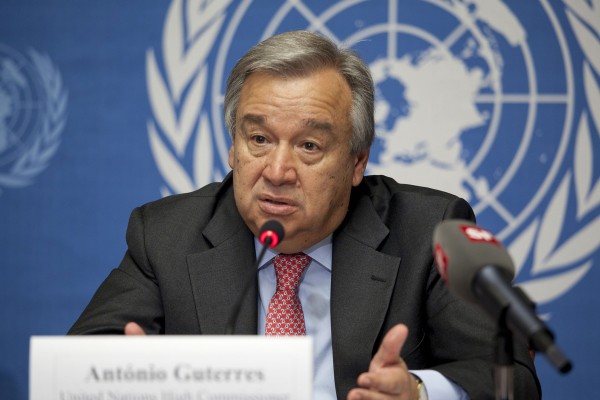UN Calls for Swift Action Against the International Food Crisis
UN Secretary-General Antonio Guterres once again warned of an impending increase in global famine at the recent meeting on global hunger taking pace at UN Headquarters. He highlighted the importance of the wheat supply shortfall from Ukraine and outlined a five-point plan to avert the coming crisis.
 Antonio Guterres expresses concern about the rising number of hungry people. / Picture: © Wikimedia Commons / U.S. Mission Photo by Eric Bridiers [Public Domain]
Antonio Guterres expresses concern about the rising number of hungry people. / Picture: © Wikimedia Commons / U.S. Mission Photo by Eric Bridiers [Public Domain]
Antonio Guterres recently warned of a "new high" in global famines and called for swift action to combat the current rise in food insecurity.
The facts speak for themselves: the number of people facing severe food insecurity has more than doubled in the last two years - in numbers: 135 million people before the pandemic to 276 million today. Of these vulnerable people, half a million are suffering from acute hunger, a staggering 500 per cent increase compared to 2016.
"These frightening numbers are inextricably linked to conflict, both as a cause and an effect," Guterres said. "If we do not feed people, we feed conflict".
In our world of plenty, I will never accept the death from hunger of a single human being.
— António Guterres (@antonioguterres) May 19, 2022
Today, I urged members of the Security Council to take action – now– to break the deadly dynamic of conflict and hunger. pic.twitter.com/kLf2nHAQAC
Triggers for hunger
Climate catastrophe is one of the key triggers for global hunger, he added, pointing out that 1.7 billion people have been affected by extreme weather and climate-related disasters in the last decade.
This was exacerbated in recent years by, among other things, the COVID-related economic shock, which had exacerbated food insecurity through losses in income and disruptions in supply chains.
This led to an obvious uneven economic recovery. With access to international financial markets partially blocked, some developing countries are now on the brink of bankruptcy and at risk of becoming insolvent. In conclusion, Guterres blamed the war in Ukraine for the rapidly deteriorating developments, as it accelerates all three factors, climate change, COVID and inequality.
The impact of the war in Ukraine
The warlike conflicts and supply stoppages partially eliminated Ukraine and Russia as wheat producers for the world market. This is a huge disaster as Ukraine and Russia together produce almost a third of the world's wheat and barley and half of the world's sunflower oil.
The war threatens to plunge "tens of millions of people into food insecurity, followed by malnutrition, mass starvation and famine, in a crisis that could last years," the UN chief warned.
Five steps to end hunger
However, if we act together, there will be enough food for all, he said, adding that "ending hunger is within our reach".
Five urgent steps are needed to solve the short-term crisis and avoid long-term damage, he said, starting with reducing market pressures by increasing food supply - without export restrictions and with surpluses available to those most in need.
Second, social protection systems must provide food and cash to all those in need, and water, sanitation, nutrition and livelihood support must be provided.
Third, governments must promote agricultural production and invest in resilient food systems that protect smallholder food producers.
Finally, humanitarian action must be fully funded to prevent famine and reduce hunger.
Urgent opening of ports
The head of the World Food Programme (WFP), David Beasley, pointed to a world that is "too fragile" due to years of conflict, pandemics and climate threats.
He also pointed out that current funding shortfalls could hinder food access for up to four million people.
In addition, the top WFP official pointed out that failure to open ports in Ukraine and beyond will push people to the brink of starvation.
Although the "silos are full", blockades and other obstacles make them inaccessible, Beasley said, urging governments to "act now".



